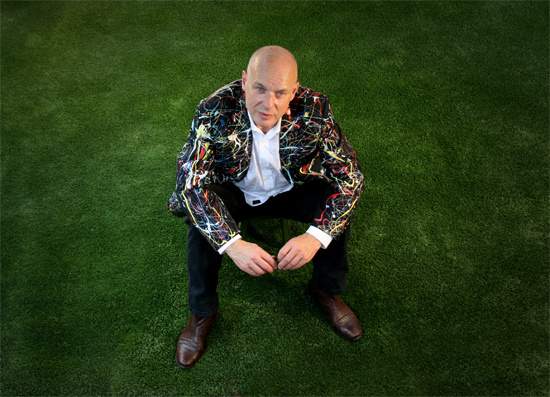Brian Eno has hinted at the sonic aesthetics of his forthcoming new studio LP, Small Craft On A Milk Sea, his first on the Warp label. In a statement issued this morning, Eno has said that the album will be shaped by the idea of film soundtracks, and evocations of place and space. Read the text of his communique, and those of collaborators John Hopkins and Leo Abrahams, below. Small Craft On A Milk Sea is released on November 1st.
"In the early 70s I found myself preferring film soundtracks to most other types of records. What drew me to them was their sensuality and unfinished-ness – in the absence of the film they invited you, the listener, to complete them in your mind. If you hadn’t even seen the film, the music remained evocative – like the lingering perfume of somebody who’s just left a room you’ve entered. I heard Nino Rota’s Fellini soundtracks often before I saw the films and in listening to them I found I could imagine a whole movie in advance: and though it usually turned out to be nothing much like Fellini’s version, it left me with the idea that a music which left itself in some way unresolved engaged the listener in a particularly creative way.
"The work in this collection is a result of an occasional collaboration between myself, Leo Abrahams and Jon Hopkins. The two of them are gifted young player/composers whose work, like mine, is intimately connected to the possibilities and freedoms of electronic music. Over the last few years we’ve worked together several times, enjoying exploring the huge new sonic territories now available to musicians. Mostly the pieces on this album resulted not from ‘composition’ in the classical sense, but from improvisation. The improvisations are not attempts to end up with a song, but rather with a landscape, a feeling of a place and perhaps the suggestion of an event. In a sense they deliberately lack ‘personality’: there is no singer, no narrator, no guide as to what you ought to be feeling. If these pieces had been used in films, the film would complete the picture. As they stand, they are the mirror-image of silent movies – sound-only movies.
"I am especially pleased to be releasing this new material on Warp, for a long time one of the truly innovative labels. I am pleased to be in the company of many artists whose work I’ve followed and admired over the years. I look forward to a rewarding relationship." – Brian Eno (September, 2010)
"I’ve been playing improvised music with Jon Hopkins since we were teenagers at school together. His style was distinct from the start and I loved going into that world. There was no preoccupation with showing virtuosity or establishing narrative – it was pure sound. When I first started working with Brian in 2001 on the ‘Drawn From Life’ project, there were improvised elements and I felt that my experience with Jon had somehow prepared me.
"Most of the music on Small Craft is improvised and, although much of it has been heavily edited, there is a sense of innocence and joy that has been preserved from the time they were made. For me, the feeling that sums up the experience of making music with Brian is liberation." – Leo Abrahams
"To me these tracks have a sense of place, mystery and otherness that doesn’t sound specifically like the playing of any of the three of us but rather a new entity. It is in none of our natures to try and dominate any improvisation with a traditional "lead part", preferring instead to jointly build up a complex background of sound and texture, which we would generally lay down as a starting point. Then Brian might direct us into more rhythmic or melodic territory once this landscape is established.
"Some of the more melodic pieces began with Brian asking Leo and myself to write down a series of random chords, which he would then write on a white board, along with a number – the number of bars we should stay on that chord for. Brian would then stand and point to chords at random, not knowing how (and if) they will link to each other, and Leo and I would lay down parts in the corresponding keys for the written number of bars.
"This avoidance of any traditional song-writing techniques in favour of ideas like these has led to very few standard chord structures and a genuine element of randomness in the process, which I think contributes to the overall sense of mystery in these recordings." – John Hopkins



